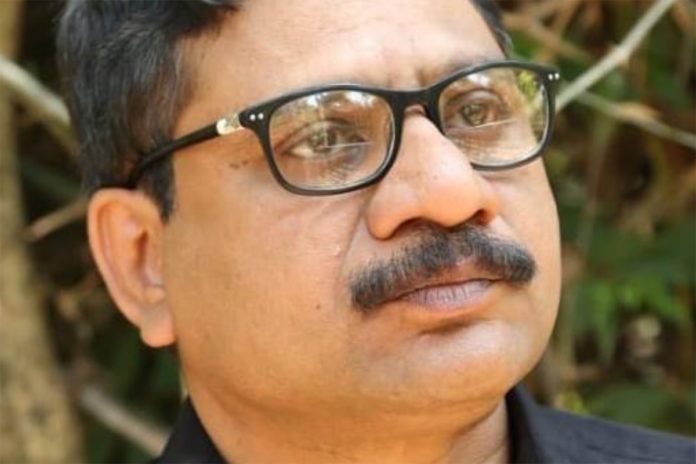Malayalam Poetry in Translation – 7
Translated by Aditya Shankar
(Translator’s Note: The finest of contemporary Malayalam poetry represents the latest poetic sensibility that is on view today. A poem that is able to mend its language and meaning, and blend into the issues of our time will break the barriers of language eventually. In fact, as a translator, I believe it becomes the need of other languages to grow and adapt to the new shapes of meaning that a poem carves for itself. My project ‘Malayalam Poetry in Translation’ is an attempt to showcase the work of some of the finest poets writing in Malayalam. I believe it is only apt to clarify in this note that new poetic sensibility is in no way co-related to the age of a poet, but is a product of her/his poetic outlook and awareness. Also, the scope of this translation series is limited to a sample size and do not encompass the entire spectrum of contemporary Malayalam poetry. Every notable poet manages to continually reinvent his poetic landscape and the poets featured in this series are no exception.)
*
Single Room
When bedridden,
even a tiny one room house
can become a big world.
A sea’s distance to the nearest object,
a birth’s distance to the nearest being.
Your language may become alien to all.
The sound of others, a light year away.
Your hand that extends
to grab the glass on the teapoy
is extending to a foreign country.
To discard the wilted flowers in the vase,
to reach the old magazine,
you will turn into a schooner sailing downwind.
In order to reach you,
a short reply will have to traverse
the hills and valleys in your ear.
In that home with a single room,
there will be various times.
No news will reach you
before it turns cold and frozen.
You are no more waiting
for what you waited all this while.
When you are bedridden,
the world doesn’t shrink within four walls,
the room turns into a world.
Like never before,
your body turns into your own neighborhood.
(Translation of Ottamuri, P.13, Madhyamam Weekly, Issue 1098, Thrissur)
Vote
The deceased arrived to vote,
at a lonely and dark booth.
Are you here to vote?
the officer asked.
Yes,
they answered in unison.
We are from heaven
where there are no issues.
In fact, it is luxurious.
But, we are bored.
Same ruler, same cheer.
No democracy at heaven.
You are right,
agreed the officer.
Democracy is only on earth,
that too at select places.
But, there is no difference.
We have been voting for so long,
but the ruler never changes.
It’s always the devil.
(Translation of Vote, P. 298, Rafeeq Ahammadinte Kavithakal, Mathrubhumi Books, Thrissur)
Endless Rain
On the night Ummukulsu died,
Umma stood outside, alone.
All the kin had left,
the courtyard had become deserted.
The chairs, lights, mats on rent were taken away.
The murk spread till the base of
the champak Ummukulsu had planted,
wiping the teary light of the tiny kerosene lamp.
Grazing the slipper she left on the stone steps,
an Asian Koel roosted in the rock-ribbed patio, detached.
The wind fooled around, patted her slightly torn top on the southward clothesline, ascended the tree.
On the night Ummukulsu died,
Umma stood outside, alone.
An abrupt downpour and Umma scurried in
and darted out with a dotted umbrella,
its broken rib that Ummukulsu nattered about.
At the cemetery, Umma placed the umbrella
over the heap of freshly leveled soil.
Endless, the rain on Ummukulsu’s death night.
(Translation of Thoramazha, P.283, Rafeeq Ahammadinte Kavithakal, Mathrubhumi Books, Thrissur)
About the Author:
Rafeeq Ahamed (b. December 1961) is a Malayalam poet, lyricist and novelist. He has won the Kerala Sahitya Akademi Award for Poetry and is a five-time winner of the Kerala State Film Award for Best Lyrics. With more than 500 songs to his credit, he is regarded as the most successful and critically acclaimed lyricist of contemporary Malayalam cinema.
About the Translator:

Aditya Shankar is a Pushcart Prize and Best of the Net nominated poet, flash fiction author, and translator. He edited Tiny Judges Shall Arrive (AHRC, Hong Kong), a selection of KG Sankara Pillai’s poems translated into English. His translations have appeared in the SAARC anthology of poetry, Muse & Murmur, Modern Poetry in Translation, Ethics in Action and elsewhere. His poems have been translated into Malayalam and Arabic and published from 20 or more nations. His poetry collections include After Seeing (2006), Party Poopers (2014), and XXL (Dhauli Books, 2018). His short films have participated in International Film Festivals. He lives in Bangalore, India . (https://adityashankar.ucraft.net/).
















